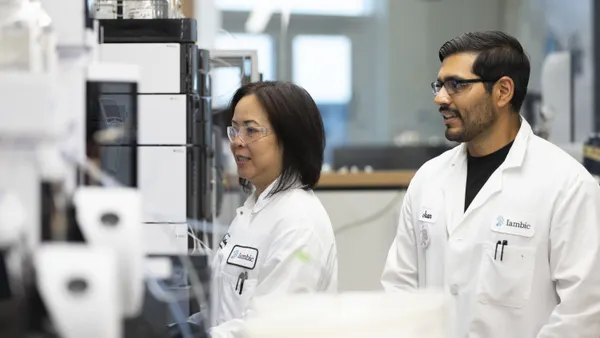Today, a brief rundown of news involving Ferring Pharmaceuticals and Solu Therapeutics, as well as updates from the American Society of Hematology, Bristol Myers Squibb, and PureTech Health that you may have missed.
In its first full year on the market, Ferring Pharmaceuticals’ bladder cancer therapy Adstiladrin earned 70 million euros, or about $77 million, according to financial figures released Wednesday by the Swiss company. The treatment, a kind of gene therapy delivered locally to bladder cells, won U.S. approval in late 2022, but wasn’t made fully available until January 2024. Ferring is continuing to build out its manufacturing capacity for the drug, which it sees as a major driver of business growth in the coming years. — Ned Pagliarulo
Solu Therapeutics said Wednesday it raised $41 million in a Series A round. The company also disclosed that it has dosed the first patient in a Phase 1 trial of people with blood cancers such as resistant/refractory chronic myelomonocytic leukemia. Cash from the raise will also be used to develop new experimental treatments including a mast cell depletor for immune conditions, according to Solu. The company, which was launched by Longwood Fund, debuted in 2023 with a $31 million seed round. It licensed technology and drug candidates from GSK. — Gwendolyn Wu
The American Society of Hematology and 95 other organizations wrote a letter to Health and Human Services Secretary Robert F. Kennedy Jr. asking him to restore a dismantled division within the Centers for Disease Control and Prevention. The Tuesday letter requested the Division of Blood Disorders and Public Health Genomics be reinstated immediately, arguing that elimination of the subagency would have "severe and irreversible consequences." The division, which was affected by sweeping cuts across HHS, works directly with states and healthcare providers to address blood disorders. — Delilah Alvarado
Bristol Myers Squibb’s cancer immunotherapies Opdivo and Yervoy gained Food and Drug Administration approval as a first-line combination treatment for mutated forms of colorectal cancer that can’t be removed with surgery or has spread beyond the primary site, the company said Tuesday. Approval came more than two months ahead of the June 23, 2025 deadline the agency set when it accepted Bristol Myers’ application. The FDA based its approval on results of a study called Checkmate-8HW in people with the cancer, called microsatellite instability-high or mismatch repair deficient disease. The Opdivo-Yervoy regimen was tested against Opdivo alone and chemotherapy. In participants who had not been previously treated for their disease, the Opdivo-Yervoy combination reduced the risk of progression or death by 79% compared to chemotherapy. Among all patients, including those whose disease progressed after earlier treatments, Opdivo and Yervoy reduced the risk of progression or death by 38%. Opdivo alone was already approved for people with this form of colorectal cancer following progression on chemotherapy.— Jonathan Gardner
Sweden-based Nordic Capital will no longer move forward with an attempt to buy PureTech Health, after PureTech’s board of directors rejected the private equity firm’s offer. The biotechnology incubator, which launched companies like Karuna Therapeutics and Seaport Therapeutics, issued a statement on Monday about its back-and-forth with Nordic, giving the latter 28 days to make its plans clear. Nordic issued a statement of its own soon after. PureTech found itself in a similar situation in 2022, when merger talks with Nektar Therapeutics were called off. — Gwendolyn Wu













